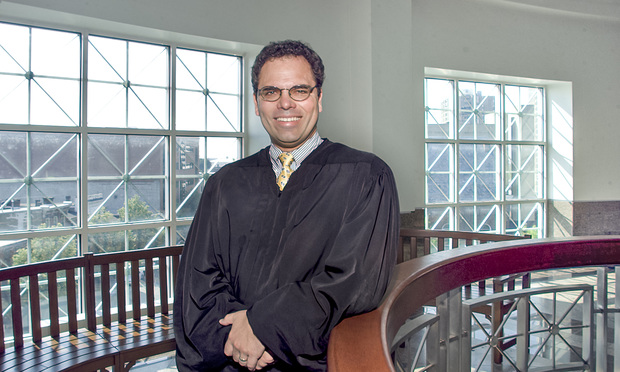Proposed Rule Change Would Revise Lawyer's Duty of Client Confidentiality
If the revised rule is adopted, New Jersey would be the third state to adopt an exception to client-confidentiality obligations for information relating to wrongful convictions, after Alaska and Massachusetts.
May 27, 2020 at 05:05 PM
3 minute read
 New Jersey Appellette Division Judge Jack Sabatino/photo by Carmen Natale
New Jersey Appellette Division Judge Jack Sabatino/photo by Carmen Natale
The New Jersey Supreme Court is seeking input on a proposed rule change that would require lawyers to speak up if they hear information suggesting an innocent person has been wrongly incarcerated.
If the revised rule is adopted, New Jersey would be the third state to adopt an exception to client-confidentiality obligations for information relating to wrongful convictions. The other two are Alaska and Massachusetts.
The proposed rule change, if adopted, would change RPC 1.6 to create an exception to the duty to keep client information confidential if that information demonstrates that an innocent person was wrongly convicted of a crime with significant penal consequences. The judiciary is accepting written comments through June 26 on the proposal made public Wednesday.
The proposal caused a division among the 21-member Supreme Court Working Group on the Duty of Confidentiality and Wrongful Convictions, with a majority favoring the amendment, according to a report by the group's chairman, Jack Sabatino, the Appellate Division deputy presiding judge for administration.
"The majority acknowledges that lawyers who reveal client confidences to remedy a wrongful incarceration necessarily harm their own client," Sabatino wrote. "The majority accepts that the client is likely to suffer consequences—the same consequences that the innocent person is currently suffering. Given the tension between a weighty moral obligation and the duty of confidentiality, the majority resolves the tension in favor of the moral obligation."
A significant minority of the group recommended no change, including representatives of the offices of the attorney general and public defender, Sabatino said. Those group members "adamantly insist that lawyers should not disclose information that is likely to expose their clients to criminal liability. The recommended new rule would require the lawyer to disclose that the client has committed a crime. This proposed exception would require lawyers not only to betray their clients, but also to inflict direct harm on them," Sabatino wrote.
The working group considered recommending the rule be changed only if the state is prevented from using that client's statement in a future prosecution of them, Sabatino wrote. There is currently no statutory mechanism for providing immunity when one person offers information about another's wrongful conviction or incarceration, he wrote.
Granting immunity offers protection to the client, but "the group decided that a rule change contingent on enactment of such an immunity statute simply is not viable," Sabatino wrote.
"The Working Group does not recommend that the court request the legislature to pass a new immunity statute. An immunity statute for reporting a wrongful conviction is likely to be controversial and is readily subject to abuse," Sabatino wrote.
In addition to Sabatino, the working group included seven other state judges, six representatives of state agencies, two representatives of academia, as well as other members from the New Jersey State Bar Association, the Garden State Bar Association, the ACLU, the Hispanic Bar Association of New Jersey, the Muslim Lawyers Association of New Jersey and the Association of Criminal Defense Lawyers of New Jersey.
This content has been archived. It is available through our partners, LexisNexis® and Bloomberg Law.
To view this content, please continue to their sites.
Not a Lexis Subscriber?
Subscribe Now
Not a Bloomberg Law Subscriber?
Subscribe Now
NOT FOR REPRINT
© 2025 ALM Global, LLC, All Rights Reserved. Request academic re-use from www.copyright.com. All other uses, submit a request to [email protected]. For more information visit Asset & Logo Licensing.
You Might Like
View All

Judge Jablonski and Chief Justice Rabner Both Acted Completely Properly
4 minute read
In 2-1 Ruling, Court Clears Way for Decade-Old Wrongful Imprisonment Suit
5 minute read
Trending Stories
- 1DC Bar’s Proposed Anti-Discrimination, Harassment Conduct Rule Sees More Pushback
- 2California's Chief Justice Starts Third Year With Questions About Fires, Trump and AI
- 3Justin Baldoni Sues Blake Lively and Ryan Reynolds for $400M in New Step in 'It Ends With Us' Fight
- 4Top Leadership Changes Coming for NJ Attorney General's Office
- 5SCOTUSBlog Co-Founder Tom Goldstein Misused Law Firm Funds, According to Federal Indictment
Who Got The Work
J. Brugh Lower of Gibbons has entered an appearance for industrial equipment supplier Devco Corporation in a pending trademark infringement lawsuit. The suit, accusing the defendant of selling knock-off Graco products, was filed Dec. 18 in New Jersey District Court by Rivkin Radler on behalf of Graco Inc. and Graco Minnesota. The case, assigned to U.S. District Judge Zahid N. Quraishi, is 3:24-cv-11294, Graco Inc. et al v. Devco Corporation.
Who Got The Work
Rebecca Maller-Stein and Kent A. Yalowitz of Arnold & Porter Kaye Scholer have entered their appearances for Hanaco Venture Capital and its executives, Lior Prosor and David Frankel, in a pending securities lawsuit. The action, filed on Dec. 24 in New York Southern District Court by Zell, Aron & Co. on behalf of Goldeneye Advisors, accuses the defendants of negligently and fraudulently managing the plaintiff's $1 million investment. The case, assigned to U.S. District Judge Vernon S. Broderick, is 1:24-cv-09918, Goldeneye Advisors, LLC v. Hanaco Venture Capital, Ltd. et al.
Who Got The Work
Attorneys from A&O Shearman has stepped in as defense counsel for Toronto-Dominion Bank and other defendants in a pending securities class action. The suit, filed Dec. 11 in New York Southern District Court by Bleichmar Fonti & Auld, accuses the defendants of concealing the bank's 'pervasive' deficiencies in regards to its compliance with the Bank Secrecy Act and the quality of its anti-money laundering controls. The case, assigned to U.S. District Judge Arun Subramanian, is 1:24-cv-09445, Gonzalez v. The Toronto-Dominion Bank et al.
Who Got The Work
Crown Castle International, a Pennsylvania company providing shared communications infrastructure, has turned to Luke D. Wolf of Gordon Rees Scully Mansukhani to fend off a pending breach-of-contract lawsuit. The court action, filed Nov. 25 in Michigan Eastern District Court by Hooper Hathaway PC on behalf of The Town Residences LLC, accuses Crown Castle of failing to transfer approximately $30,000 in utility payments from T-Mobile in breach of a roof-top lease and assignment agreement. The case, assigned to U.S. District Judge Susan K. Declercq, is 2:24-cv-13131, The Town Residences LLC v. T-Mobile US, Inc. et al.
Who Got The Work
Wilfred P. Coronato and Daniel M. Schwartz of McCarter & English have stepped in as defense counsel to Electrolux Home Products Inc. in a pending product liability lawsuit. The court action, filed Nov. 26 in New York Eastern District Court by Poulos Lopiccolo PC and Nagel Rice LLP on behalf of David Stern, alleges that the defendant's refrigerators’ drawers and shelving repeatedly break and fall apart within months after purchase. The case, assigned to U.S. District Judge Joan M. Azrack, is 2:24-cv-08204, Stern v. Electrolux Home Products, Inc.
Featured Firms
Law Offices of Gary Martin Hays & Associates, P.C.
(470) 294-1674
Law Offices of Mark E. Salomone
(857) 444-6468
Smith & Hassler
(713) 739-1250






